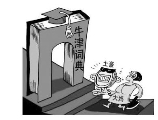题目内容
China’s new buzzword, tuhao, may be in nextyear’s Oxford English Dictionary.

“If its influence continues, it is very likely to appear on our updated list of words, ”said Julie Kleeman, project manager with the editing team.
In Chinese, tu means uncouth and hao means rich. It has traditionally been referred to rich people who throw their weight around in China’s rural areas. In recent years, people borrowed the term to describe those who spend money in an irrational(没道理的)manner. The word gained credence in September with the launch of Apple’s new gold-colored iPhone, an item loved by China’s rich people. The color became known as “tuhao gold. ”The word is now often used by the online community to refer topeople who have the cash but lack the class to go with it.
Kleeman also mentioned two other Chinese words—dama and hukou—which may also be taken in the dictionary. Hukou means household registration in Chinese and has been widely used.
Dama, meaning middle-aged women, was first used in the Western media by the Wall Street Journal in May when thousands of Chinese women were buying up record number of gold. They were the driving force in the global gold market between April and June when the gold prices had slumped(下跌).
“We have nearly 120 Chinese-linked words now in Oxford English Dictionary, ”she said. Some of them are: Guanxi, literally meaning“connection”, is the system of social networks and influential relationships which facilitate business and other dealings. Taikonaut is a mix of taikong, meaning outer space, and astronaut.
The new words will be first uploaded on the official website before the dictionaries arrive. The online version is also renewed every three months. “It at least broke our old rules. It used to take 10 years to include a new word but now we keep the pace with the era, ”according to John Simpson.
1.What does “Tuhao” mean now?
A. The rich who like iPhone made of gold.
B. The people who have power in the countryside.
C. The people who spend money reasonably.
D. The rich who find no class to belong to.
2.Why is the word “Dama” popular now?
A. They bought gold in the global market.
B. They are wealthy middle-aged women.
C. They brought the gold prices down.
D. They worked on the Wall Street.
3.Which word has already been in the Oxford English Dictionary?
A. Tuhao. B. Taikonaut. C. Dama. D. Hukou.
4.According to John, the Oxford English Dictionary .
A. updates its new version every three months
B. takes 10 years to include a new word now
C. speeds up its acceptance of new words
D. has its online version to collect new words
1.D
2.A
3.B
4.C
【解析】
1.细节理解题。根据第三段的The word is now often used by the online community to refer to people who have the cash but lack the class to go with it. 可知, tuhao指的是那些有钱但是没有阶层归属的人们。
2.细节理解题。根据第五段的when thousands of Chinese women were buying up record number of gold. They were the driving force in the global gold market可知, 大妈一词来自于购买国际市场上黄金的人们。
3.细节理解题。根据倒数第二段的We have nearly 120 Chinese-linked words now in Oxford English Dictionary和Taikonaut is a mix of taikong, meaning outer space, and astronaut可知选B。
4.推理判断题。根据最后一段的It used to take 10 years to include a new word but now we keep the pace with the era可知, 现在牛津词典收录新词的速度快了。
